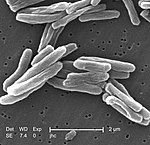Phantom Plague
 | |
| Author | Vidya Krishnan |
|---|---|
| Language | English |
| Genre | non-fiction, health |
| Published | 1 Feb 2022 |
| Publisher | PublicAffairs |
| Pages | 288 |
| ISBN | 9781541768468 |
Phantom Plague: How Tuberculosis Shaped our History is a 2022 non-fiction book about the history of tuberculosis by health journalist Vidya Krishnan.[1][2]
It covers the history of tuberculosis through the 19th, 20th, and early 21st centuries, from early understandings of the disease to modern public health and pharmaceutical interventions. The book explores how flawed philanthropy, politics, racism, and anti-science rhetoric have led to "medical apartheid".
Production[edit]
Krishnan wrote Phantom Plague over seven years, therefore before and during the COVID-19 pandemic.[3]
Summary[edit]
Phantom Plague covers the history of tuberculosis covering 19th-century New York City slums to present day India.[4][5] It contrasts the spread of tuberculosis through crowded urban settlements, but also mentions affluent tuberculosis patients such as George Orwell, Franz Kafka, Eleanor Roosevelt, Frédéric Chopin, and the Brontë sisters.[6][7]
The book documents early folk remedies, attempted public health measures,[6] and the rise of scientific solutions.[5] It mentions the work of Ignaz Semmelweis, Robert Kock, Joseph Lister, and Louis Pasteur to advance human understanding of infectious diseases.[3] It documents the rise of germ theory, use and abuse of antibiotics and the epidemiological effects of crowded housing conditions on disease spread.[6] It notes the World Health Organization's estimate that 25% of the world have latent tuberculosis.[6] The book talks about the risk of drug-resistant tuberculosis and failed attempts to curtail the spread of tuberculosis.[4][5]
Phantom Plague critiques authoritarian governments, the "toxic kindness" of philanthropists, anti-science rhetoric, and describes the modern context for tuberculosis patients as "medical apartheid".[5][3]
Krishnan includes themes of racism, greed, and politics in Phantom Plague.[4][6]
Reception[edit]
Phantom Plague is described as "absolutely fascinating" by Victoria Irwin,[4] Madhukar Pai describes the book as "urgent, riveting and fascinating".[5]
Kirus Reviews described it as timely and significant.[6] Scroll.in described the book as a fascinating story of human determination against tuberculosis as well as prejudice, anti-science and medical apartheid.[8]
The New York Times describes it as "clear and compelling" and a "worthy read".[3]
References[edit]
- ^ Tinsley, Orla. "Two books on death and disease, but only one of them hits the mark". The Irish Times. Retrieved 2022-02-13.
- ^ Harper, Kyle (18 Feb 2022). "'Phantom Plague' Review: Tuberculosis Past, and Future". The Wall Street Journal.
- ^ a b c d Mandavilli, Apoorva (2022-02-05). "Battling an Ancient Scourge". The New York Times. ISSN 0362-4331. Retrieved 2022-02-10.
- ^ a b c d Irwin, Victoria (2022-01-09). "'The Phantom Plague' Looks at How Tuberculosis is Again a Threat Due to Unequal Medical Care". FangirlNation Magazine. Retrieved 2022-01-17.
- ^ a b c d e "30 Best Epidemic Books of All Time". BookAuthority. Retrieved 2022-01-17.
- ^ a b c d e f PHANTOM PLAGUE | Kirkus Reviews.
- ^ Brink, Susan (2022-02-13). "Before COVID, TB was the world's worst pathogen. It's still a 'monster' killer". NPR. Retrieved 2022-02-13.
- ^ Debnath, Sayari (5 February 2022). "Seven recently published books that will take you through the shortest month of the year". Scroll.in. Retrieved 2022-02-11.

